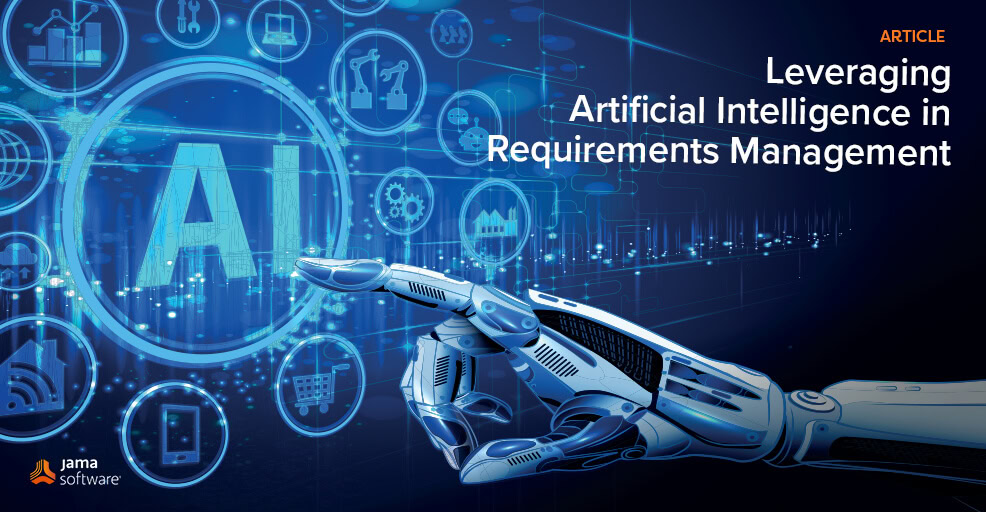
Leveraging Artificial Intelligence in Requirements Management
Artificial Intelligence (AI) is everywhere – from healthcare, to finance, to customer service – the integration of AI into various business processes has become a game-changer. One area where AI’s impact is particularly profound is in requirements management, a key process in product, systems, and software development.
Effective requirements management is crucial for the success of any project, ensuring that the final deliverables align with stakeholders’ needs and expectations. By leveraging AI, organizations can enhance their requirements management processes, leading to improved project outcomes, increased efficiency, and reduced risks.
Understanding Requirements Management
Requirements management involves the process of gathering, analyzing, documenting, and managing the needs and requirements of stakeholders throughout the project lifecycle. It ensures that all project requirements are clearly defined, tracked, and verified, minimizing the chances of misunderstandings and errors. Traditional requirements management, while effective, can be time-consuming and prone to human error. This is where AI steps in, offering innovative solutions to streamline and enhance the process.
RELATED: How the EARS Notation Supports Effective Requirements Management and Live Traceability™
The Role of AI in Requirements Management
- Automated Requirements Elicitation: AI-powered tools can automatically gather requirements from various sources, such as emails, documents, and meeting notes. Natural Language Processing (NLP) algorithms can analyze text data to extract relevant information, saving time and ensuring that no critical requirements are overlooked.
- Intelligent Document Analysis: AI can analyze and interpret complex documents, identifying key requirements and relationships between them. This capability allows for more accurate and comprehensive requirements documentation, reducing the risk of misinterpretation and gaps.
- Enhanced Traceability and Impact Analysis: AI can improve traceability by automatically linking requirements to their corresponding design elements, test cases, and implementation tasks. In the event of a change in requirements, AI can quickly assess the impact on the project, providing valuable insights for decision-making.
- Predictive Analytics and Risk Management: AI can analyze historical project data to identify patterns and predict potential risks and challenges. By leveraging predictive analytics, organizations can proactively address issues before they escalate, ensuring smoother project execution.
- Real-time Collaboration and Feedback: AI-powered collaboration tools facilitate real-time communication and feedback among stakeholders, ensuring that everyone is on the same page. These tools can also provide intelligent suggestions and recommendations, enhancing the quality of discussions and decisions.
- Continuous Learning and Improvement: AI systems can continuously learn from past projects and refine their algorithms, leading to ongoing improvements in requirements management processes. This continuous learning capability ensures that organizations stay ahead of the curve and adapt to evolving project needs.
Case Study: AI in Action
Consider a software development company implementing AI in their requirements management process. By using an AI-driven tool, the company automated the elicitation of requirements from client emails and documents. The tool identified and categorized requirements, linking them to specific project tasks and design elements. This automation reduced the time spent on manual documentation by 50%, allowing the team to focus on higher-value activities.
Moreover, the AI tool provided real-time impact analysis when changes were requested by the client. It quickly identified affected areas, allowing the team to make informed decisions and adjust project plans accordingly. The result was a more agile and responsive project management process, leading to increased client satisfaction and successful project delivery.
Conclusion
The integration of Artificial Intelligence in requirements management represents a significant advancement in how organizations handle complex projects. By automating routine tasks, enhancing traceability, and providing predictive insights, AI empowers teams to deliver high-quality projects on time and within budget. As AI technology continues to evolve, its impact on requirements management will only grow, offering even more innovative solutions to meet the challenges of tomorrow’s projects.
Organizations that embrace AI in their requirements management processes will not only improve their project outcomes but also gain a competitive edge in an increasingly dynamic and demanding business environment.
Note: This article was drafted with the aid of AI. Additional content, edits for accuracy, and industry expertise by McKenzie Jonsson and Mario Maldari.
RELATED: Best Practices for Writing Requirements Webinar
Unleash the Full Potential of Your Requirements with Jama Connect Advisor™
Successful product delivery starts with precise, well-written requirements that align design, software, and hardware teams with clear project goals. Jama Connect Advisor™ is a cutting-edge tool powered by natural language processing, guiding system engineers and product developers to create effective requirement specifications based on INCOSE and EARS standards.
Teams are using Jama Connect Advisor to:
- Improve the quality and usability of requirements
- Save time authoring, reviewing, and updating requirement statements
- Continuously enhance team requirement authoring skills with regular use
- Deliver programs and projects on time and on budget with long-term success
LEARN MORE:
Improve the quality of your requirements, save time, and enhance team skills with Jama Connect Advisor™.
- Requirements Management Software Jama Connect Breaks Records for Scalability - February 9, 2026
- Next Generation Nuclear: Reactor Innovations Shaping 2025 - November 11, 2025
- Tech Giants Turn to Nuclear Power for AI’s Energy Appetite - October 14, 2025